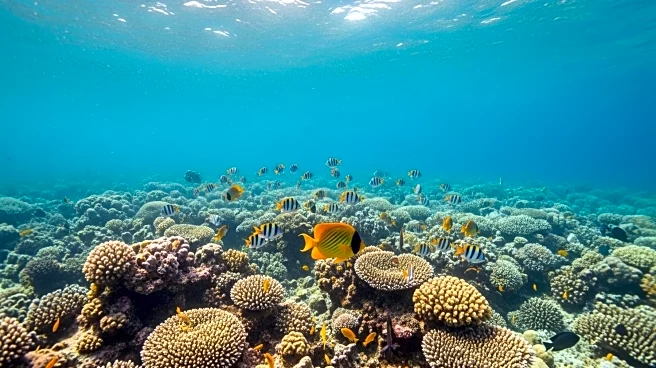What's Happening?
A significant international agreement, known as the High Seas Treaty, has been ratified by 60 nations, including Morocco, marking a major step towards protecting marine biodiversity in international waters. These waters, which constitute nearly two-thirds of the ocean, are vulnerable to threats such as overfishing, climate change, and deep-sea mining. The treaty establishes a legal framework for countries to create marine protected areas and sets rules for potentially harmful activities. It also promotes technology-sharing, funding mechanisms, and scientific collaboration. However, the treaty's effectiveness is uncertain as major players like the U.S., China, Russia, and Japan have yet to ratify it.
Why It's Important?
The High Seas Treaty is crucial for safeguarding marine ecosystems that play a vital role in regulating Earth's climate and supporting biodiversity. By protecting these areas, the treaty aims to achieve the '30x30' target, an international pledge to conserve 30% of the planet's land and sea by 2030. The treaty's success depends on widespread ratification, as countries that do not join may undermine conservation efforts. The treaty's implementation could influence global marine policies and encourage nations to adopt more sustainable practices, impacting industries such as fishing and deep-sea mining.
What's Next?
Countries that have ratified the treaty will meet within a year to discuss its implementation, financing, and oversight. Only those who ratify before this meeting will have voting rights. The treaty's enforcement relies on individual countries regulating their own ships and companies, making universal ratification essential. The treaty's success will depend on the participation of major fishing nations and their commitment to conservation efforts. The treaty could also prompt nations to reconsider their domestic marine policies and enhance protections within their own waters.
Beyond the Headlines
The treaty highlights the interconnectedness of marine ecosystems and the importance of international cooperation in environmental conservation. It raises ethical questions about the responsibility of nations to protect global commons and the need for equitable access to marine resources. The treaty could lead to long-term shifts in how countries approach ocean governance and prioritize sustainability in their economic activities.









